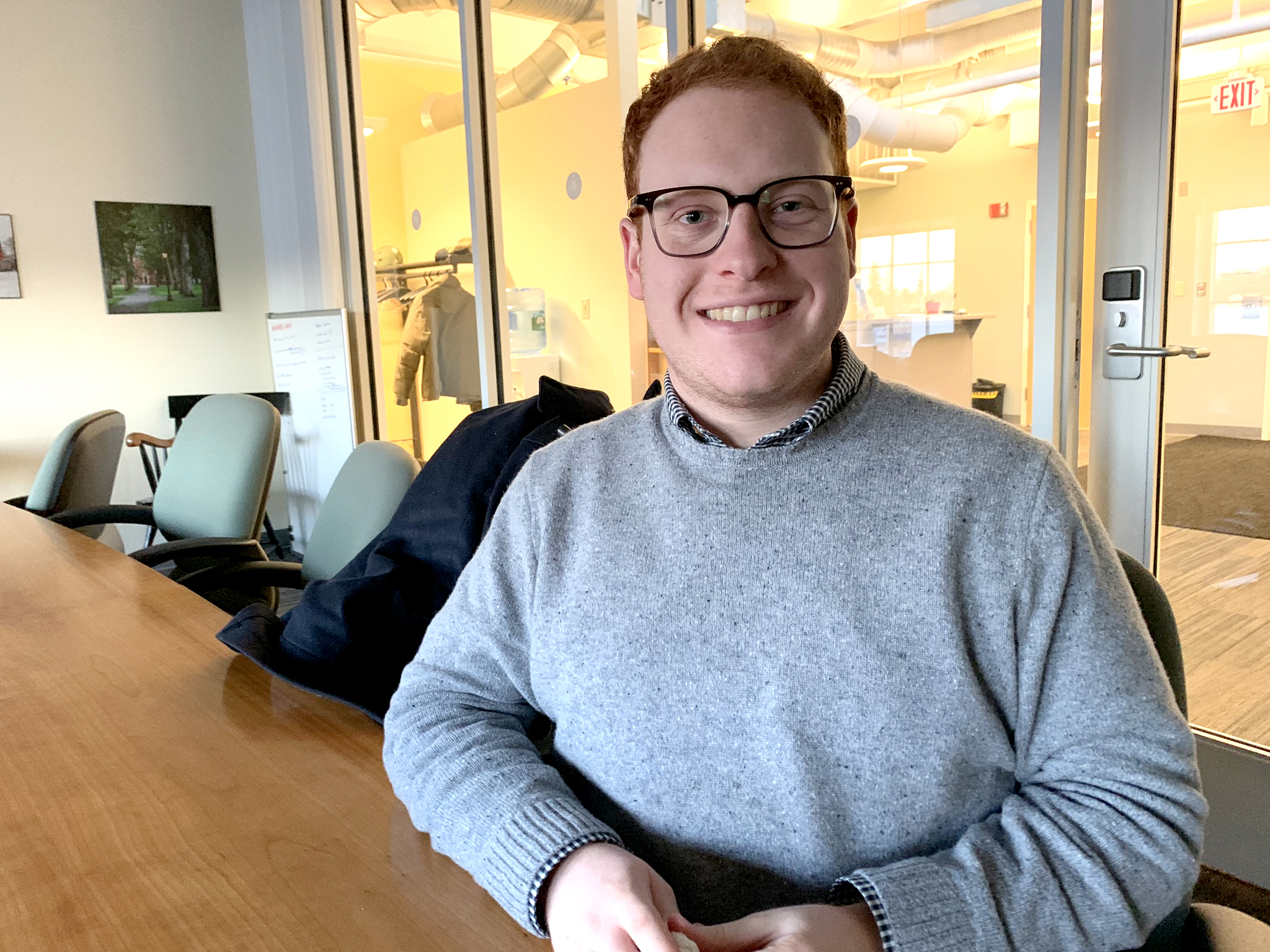Samuel Lewis ’19 Wins Scholarship to Study at Cambridge
By Rebecca Goldfine
Each year, the Keasbey Foundation awards two American seniors, from a short list of East Coast colleges and universities, with funding to attend a postgraduate program at one of the universities in the United Kingdom affiliated with the foundation.
Lewis has been admitted to the University of Cambridge's Political Thought and Intellectual History program, where he will pursue a master of philosophy degree.
"What I like about this program is that it is similar to Bowdoin in that it’ll let me do a lot of different things, including take courses and do research," Lewis said. "It is run jointly through the university faculties of classics, history, and politics, so there is a diversity of thought and methods."
At Bowdoin, Lewis is majoring in classical studies and government, with a concentration in political theory, and he is minoring in economics. He jokes that he has "commitment problems," and that Bowdoin has indulged his wide-ranging curiosity.
"What is so great about the Keasbey is that it offers another year of exploration," Lewis said. "That is its gift; it gives you the opportunity to extend your studies and keep exploring. I am really so grateful for it."
His enthrallment with the "great texts" of classical antiquity began when he took Bowdoin government professor Jean Yarbrough's class Classical Political Philosophy during his first semester. "The ancient writers had a lot of interesting ideas about philosophical problems—and those insights are still relevant today," he said. "They show us the range of what is possible for human beings, such as the radically democratic Athenian polis."
He adds in his Keasbey application, "I believe that we can mine old books not just for historically important insights, but also for illustrations of unthought-of political possibilities and questions directly relevant to our current political moment."
Along with his Bowdoin classes, Lewis credits the Peucinian Society, a longstanding student debate club at Bowdoin, with shaping him intellectually. He also volunteers with Aequora, a group of students who teach an after-school spoken Latin program at Harriet Beecher Stowe Elementary School. And he plays a lot of pick-up basketball.
Previous Keasbey scholars from Bowdoin
Hal S. Miller, 2016
University of Edinburgh, M.Sc., Science and Religion
Tenzing Lama, 2010
St. Edmund Hall, Oxford, Masters of Science, Pathology
Mary Hartley Platt, 2007
Balliol College, Oxford, M. Phil, Latin and Greek Languages and Literature
Gilman Barndollar, 2004
Selwyn College, Cambridge, M.Phil., Historical Studies
Jed Atkins, 2004
Sidney Sussex College, Cambridge, B.Phil., Ancient Philosophy
Lewis's study of the ancient societies of Athens and Rome has formed a foundation of thought for a future career in law, he says. At Cambridge, he wants to delve into the study of Athenian criminal law, focusing on what it has to say about "big contemporary questions" like the purpose of punishment in a democracy. Later, he would like to attend law school and eventually work as a federal prosecutor.
"I see [the job of federal prosecutor] as a nonpartisan way to serve in the government and help my country, and to help people who are vulnerable," Lewis said. "For me it would be the place to make a difference."
From Sam Lewis's Keasbey statement: "Before I can attend law school and then pursue federal prosecution in good conscience, I feel that I have to settle—as much as it’s possible—several concerns I have relating to justice and the rule of law. For me, the proper way to reflect on these questions is to see what old books have to say and to engage them in rigorous, sustained study...I intend to spend at least a year at Cambridge studying Political Thought and Intellectual History, which would enable me to pursue my intellectual passions, reflect on fundamental questions of criminal justice, and further my dream of one day becoming an effective, fair, and just federal prosecutor."
A few of Sam's favorite classes at Bowdoin
American Political Thought, Jean Yarbrough, government and legal studies
"My first political theory course. Opened my eyes to big political questions and the idea of reading 'great' primary source texts. Yarbrough’s lectures on the Federalist Papers and Lincoln were particularly outstanding."
Law and Economics, Zorina Khan, economics
"Every class challenged what I think and, more to the point, how I think. Khan is an incredible seminar manager, bringing the best out of her students and displaying her own vast knowledge and reasoning ability to great effect. The course material contains some of the most fascinating theoretical questions for anyone interested in law or politics."
Liberalism and Its Critics, Paul Franco, government and legal studies
"With Mill, Burke, Tocqueville, Marx, and Nietzsche—you can’t beat the reading list! Add in one of the most charismatic, energetic, and effective teachers at Bowdoin, and you’ve got a course that will expose you to the heart of the major threads of, well, liberalism’s critics. Quite a few hearty yet civil debates were had along the way."
The Story of Analytic Philosophy, Scott Sehon, philosophy
"Sehon is talented at unlocking complex arguments, making them accessible as well as entertaining. The three-hour-long weekly evening seminar did so much to help me think more clearly, write about complicated ideas in a clearer way, and speak intelligently about philosophical problems."
From Tyranny to Democracy: Models of Political Freedom in Ancient Athens, Robert Sobak, classics
"The course exposed me to democratic theory in the classics and proved that the Greeks are at least as cool as the Romans, and definitely smarter. My public speaking skills developed from the random oral presentations and the final project: a research paper delivered as a podcast."
Classes with professors Michael Nerdahl and Barbara Boyd, classics
"These two professors taught many wonderful semesters of instruction in Latin. They are some of the most skilled, caring, and knowledgeable teachers I’ve ever had, and they make Latin—thought by many to be dead—come to life."